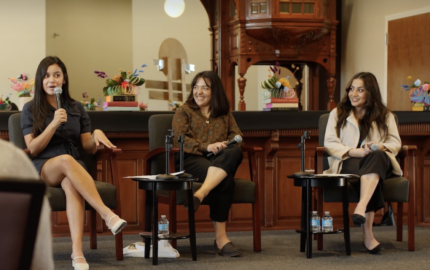As a long-time member and former D.C. chapter president of the Asian American Journalists Association, I attend AAJA’s annual convention whenever possible to reconnect with former colleagues and hear new ideas. One convention, held shortly after I launched my freelance journalism practice, stands out in my memory. I ran into an old friend between sessions, and she asked where I was working. “I’m freelancing,” I explained, with a smile. Her face fell, and she reached out an arm in support. “I’m so sorry,” she replied.
This reaction isn’t unusual. For many employed journalists who have never met a successful independent journalist, “freelancing” sounds like code for unemployed. So often, people assume that anyone who freelances must not be able to hack it in a newsroom or is secretly looking for a “real” job. As a full-time independent journalist since 2008, I actively affirm my choice of this career every Nov. 7 — the anniversary of when Newhouse News Service closed its Washington bureau and I lost my job as a national correspondent. I earn more now than I ever did while employed in a newsroom, enjoy control over my schedule, and write about topics as varied as children and trauma, the science of racial bias, the disability justice movement, why human skulls are shrinking, and what psychology tells us about how to bridge political or identity gaps.
Many freelancers I know became independent because of a layoff, consolidation, or toxic newsroom environment that pushed them out of a media organization. This is especially true for journalists of color, women, those with child or elder care responsibilities, disabled journalists, LGBTQIA+ journalists, and other marginalized groups. Unfortunately, these groups are also less likely to have enough access to credit or financial reserves to sustain themselves as newbie freelancers until they earn enough income to match their newsroom salaries. Time and again, I’ve seen talented colleagues quit journalism after a few months of freelancing because the start-up phase is so challenging.
This dynamic poses an existential threat to a healthy and diverse journalism ecosystem. U.S. society is increasingly polarized by political party and other facets of identity. Yet the people who can authentically tell stories that build empathy for other perspectives and lived experiences — diverse journalists — are underrepresented in newsrooms and among journalism decision makers. Our industry has struggled with a lack of racial and gender diversity for decades, especially among newsroom leadership. Since 2001, even as 40% of newsrooms gained racial diversity, another 16% lost it, according to the American Society of News Editors diversity survey. Women advanced in 32% of newsrooms but lost ground in 21%, ASNE found. This two steps forward, one step back situation becomes more dire in the context of the pandemic, which disproportionately harmed communities of color, cost women jobs, and led to increased journalist burnout.
The churn in journalism will only continue. Newsroom jobs have fallen 26% since 2008 and are projected to grow only 6% by 2030, according to the U.S. Bureau of Labor Statistics. By contrast, freelancing is booming. Across all industries, independent workers grew 34% in 2021, led by Gen Z and Millennials and women, according to an MBO Partners report. At the same time, the explosion of tools for reaching audiences directly, from Substack and Patreon to social media, gives individual journalists an abundance of platforms for creating and distributing our work. Increasingly, journalists want to work freelance or part time, whether for mental health reasons, child and elder care demands, disability, or for the independence it promises.
Freelance is the future, but only if independent journalists have a path to financial success. News organizations must treat independent workers as a valuable complement to their staff writers, editors, and producers, compensating us fairly for the value we provide, and investing resources in recruiting and managing their freelance contributors. Many news organizations rely entirely on freelancers to publish, and others use freelancers to cover geographic areas or topics that are important, but don’t warrant a staff position. Unfortunately, many independent journalists report being underpaid, exploited, ghosted by editors, and asked to do additional work beyond the scope of their assignments.
The other part of a healthy freelance ecosystem includes self-education, community, and tools that support the business of freelancing. That’s why my colleague Chandra Thomas Whitfield and I co-founded The Center for Independent Journalists, to share with other freelancers of color the strategies, technologies, and mutual support that enabled both of us to thrive as independent journalists for more than a decade. The mission of The CIJ is to ensure the financial and emotional sustainability of freelancers, with a focus on journalists of color and other marginalized groups. We’re bringing this community together in The CIJ’s inaugural freelance conference on March 11-12 for two full days of learning, networking with editors and each other, and connection.
We’re here, we’re committed to freelance careers, and I argue that we’re crucial to the future of journalism itself. In media, the only thing certain is change. As an independent journalist who receives income from a dozen-plus news organizations, I feel secure that I can earn a good living doing significant work, regardless of the churn in journalism or who controls newsrooms. With The CIJ, we hope to extend that security to tens of thousands of talented independent journalists who have unique stories to report and talent to contribute.



